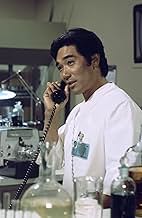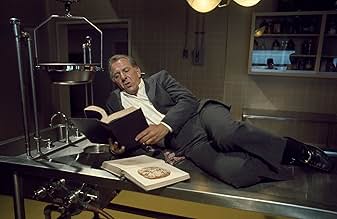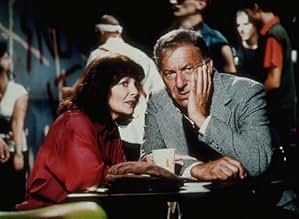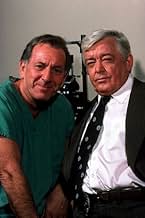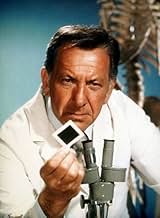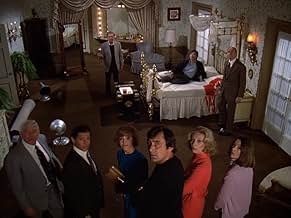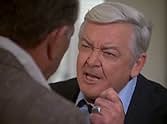Los casos de un brillante, aunque irascible, forense que investiga muertes sospechosas que suelen sugerir un asesinato.Los casos de un brillante, aunque irascible, forense que investiga muertes sospechosas que suelen sugerir un asesinato.Los casos de un brillante, aunque irascible, forense que investiga muertes sospechosas que suelen sugerir un asesinato.
- Nominado a 10 premios Primetime Emmy
- 2 premios ganados y 13 nominaciones en total
Explorar episodios
Opiniones destacadas
I have enjoyed Quincy for years--both when it first came on TV and in the years following its wide-spread syndication. Despite enjoying the show very much, I must, however, admit that the show was very formulaic and predictable. In 90% of the episodes, they stuck one of two very well-established plot outlines:
1. There is a death and it's assumed that it was by natural causes. In most of these cases, it's actually murder.
2. To Dr. Quincy, the case "just doesn't seem right" and he won't close the case--wanting to take more time with the autopsy or do some investigating on his own.
3. His boss, Dr. Asten, argues with Quincy to just wrap it all up due to either time constraints or pressure from outside sources. In essence, Asten is a bureaucratic weenie and Quincy a crusader for truth.
4. Quincy's friend, Lt. Monahan, wants to close the case because he KNOWS that it either wasn't a murder or he's blaming some innocent guy for the crime. Oddly, despite the Los Angeles Police Department being one of the largest ones in the world, somehow Monahan is almost always on the case--he's apparently a very, very busy guy--as is Quincy!
5. In the end, Quincy is vindicated. Yet, despite this, by the time they do the next episode, they once again begin this same process!
6. They all end up at Danny's and someone says something funny.
OR:
1. A death occurs.
2. Dr. Quincy becomes angry because the death was caused by some social issue such as spousal abuse, sexual abuse or poorly staffed emergency care centers, so he goes on a rampage and annoys practically everyone.
3. Quincy grandstands, makes speeches and preaches not just to the folks in the show but AT the audience.
4. Folks FINALLY listen to Quincy and they all end up at Danny's restaurant. But because it's a social issue program, they may or may not say something funny to end the show.
So why, despite the predictability of the show did I and so many others like it? Well, perhaps it was because although you knew what to expect in general, the shows were very creative in how they thought out the murders. Also, in a few cases, there weren't murders but the show managed to bring up excellent public health issues (though occasionally they were VERY preachy). Plus, over the years, the show evolved into a likable cast. Heck, after a while, you even grew to like Asten--especially since he mellowed and was less of a paper-pushing bureaucrat in later episodes.
Excellent writing, a likable cast and great imagination, this show has stood up well over time.
UPDATE: I just finished re-watching the entire series and think I should update my review. As the show progressed, the quality of the shows began to decline. The decline was slow at first but by season eight, the shows were just awful. I assume they ran out of ideas for crimes to solve, as more and more as the show progressed the shows became soapboxes for social ills NOT shows about forensic science. And, soapbox shows, while perhaps important, are far, far less entertaining.
1. There is a death and it's assumed that it was by natural causes. In most of these cases, it's actually murder.
2. To Dr. Quincy, the case "just doesn't seem right" and he won't close the case--wanting to take more time with the autopsy or do some investigating on his own.
3. His boss, Dr. Asten, argues with Quincy to just wrap it all up due to either time constraints or pressure from outside sources. In essence, Asten is a bureaucratic weenie and Quincy a crusader for truth.
4. Quincy's friend, Lt. Monahan, wants to close the case because he KNOWS that it either wasn't a murder or he's blaming some innocent guy for the crime. Oddly, despite the Los Angeles Police Department being one of the largest ones in the world, somehow Monahan is almost always on the case--he's apparently a very, very busy guy--as is Quincy!
5. In the end, Quincy is vindicated. Yet, despite this, by the time they do the next episode, they once again begin this same process!
6. They all end up at Danny's and someone says something funny.
OR:
1. A death occurs.
2. Dr. Quincy becomes angry because the death was caused by some social issue such as spousal abuse, sexual abuse or poorly staffed emergency care centers, so he goes on a rampage and annoys practically everyone.
3. Quincy grandstands, makes speeches and preaches not just to the folks in the show but AT the audience.
4. Folks FINALLY listen to Quincy and they all end up at Danny's restaurant. But because it's a social issue program, they may or may not say something funny to end the show.
So why, despite the predictability of the show did I and so many others like it? Well, perhaps it was because although you knew what to expect in general, the shows were very creative in how they thought out the murders. Also, in a few cases, there weren't murders but the show managed to bring up excellent public health issues (though occasionally they were VERY preachy). Plus, over the years, the show evolved into a likable cast. Heck, after a while, you even grew to like Asten--especially since he mellowed and was less of a paper-pushing bureaucrat in later episodes.
Excellent writing, a likable cast and great imagination, this show has stood up well over time.
UPDATE: I just finished re-watching the entire series and think I should update my review. As the show progressed, the quality of the shows began to decline. The decline was slow at first but by season eight, the shows were just awful. I assume they ran out of ideas for crimes to solve, as more and more as the show progressed the shows became soapboxes for social ills NOT shows about forensic science. And, soapbox shows, while perhaps important, are far, far less entertaining.
This is the king of formula shows. Every single episode goes down the same way:
Quincy has just gotten off of a particularly grueling case.
The boss brings in a new body that Quincy "just has to look at".
Sam, his ever faithful assistant, is just about to leave for the night before Quincy calls him back. "I need you to stay and figure this one out."
They show the 'late-night working montage', which always consists of Sam running spectral analysis tests while Quincy pokes at the body.
The montage ends, and Sam says "I don't like the looks of this Quince".
Quincy then insults Sam about the quality of his coffee.
Quincy puts on his detective hat, and interviews witnesses.
Quincy will come against opposition to him solving the case, and he will yell at that person. In fact, he will have been yelling for most of the episode, but now the yelling is of a righteous nature.
Quincy will confront his main adversary and scream, "PEOPLE'S LIVES ARE AT STAKE HERE!!"
Quincy's boss, who was against all meddling from the start, eventually comes around.
Quincy solves the case, then explains everything over breakfast/lunch/dinner with his pals.
Someone at the table tells a throw-away joke, usually at Quincy's expense, leaving everyone in stitches.
Roll credits.
Eat your heart out, Jordan Cavanaugh
Quincy has just gotten off of a particularly grueling case.
The boss brings in a new body that Quincy "just has to look at".
Sam, his ever faithful assistant, is just about to leave for the night before Quincy calls him back. "I need you to stay and figure this one out."
They show the 'late-night working montage', which always consists of Sam running spectral analysis tests while Quincy pokes at the body.
The montage ends, and Sam says "I don't like the looks of this Quince".
Quincy then insults Sam about the quality of his coffee.
Quincy puts on his detective hat, and interviews witnesses.
Quincy will come against opposition to him solving the case, and he will yell at that person. In fact, he will have been yelling for most of the episode, but now the yelling is of a righteous nature.
Quincy will confront his main adversary and scream, "PEOPLE'S LIVES ARE AT STAKE HERE!!"
Quincy's boss, who was against all meddling from the start, eventually comes around.
Quincy solves the case, then explains everything over breakfast/lunch/dinner with his pals.
Someone at the table tells a throw-away joke, usually at Quincy's expense, leaving everyone in stitches.
Roll credits.
Eat your heart out, Jordan Cavanaugh
This show was more influential than most shows of its genre on TV. In many ways, it was the predecessor to the current CSI and CSI: Miami, with its emphasis on science and the forensic approach. In fact, many of the episodes dealt with forensic methods which were just coming into being in the 70's, and for the first time let the audience of the series see these new techniques and research, including the build-up of a skeletal face to what the person could have looked like, looking for evidence of where a person has been by looking at the residue on a person's shoes and other forensic methods we take for granted nowadays.
What's even more interesting is that many of the topics of these episodes, some 25 years old, show a great amount of relevance even now. Such things as airplane safety, epidemics, political influence, riots, runaways and child pornography, post traumatic stress disorder as a result of a war experience, migrant workers, crash diets, child abuse, and much, much more.
This show was and is a great forerunner to many other shows over the past twenty-five years. In many ways, the current resurgence in shows about forensic science can be attributed to this show. Not only the commercial successes of CSI and CSI:Miami, but shows like "Forensic Files," "Cold Case Files" and other such shows. With the amount of technology which we presently have available to us now, it's amazing that a lot of it has only been available since Quincy debuted on television, less than 25 years ago.
What's even more interesting is that many of the topics of these episodes, some 25 years old, show a great amount of relevance even now. Such things as airplane safety, epidemics, political influence, riots, runaways and child pornography, post traumatic stress disorder as a result of a war experience, migrant workers, crash diets, child abuse, and much, much more.
This show was and is a great forerunner to many other shows over the past twenty-five years. In many ways, the current resurgence in shows about forensic science can be attributed to this show. Not only the commercial successes of CSI and CSI:Miami, but shows like "Forensic Files," "Cold Case Files" and other such shows. With the amount of technology which we presently have available to us now, it's amazing that a lot of it has only been available since Quincy debuted on television, less than 25 years ago.
..."Thank God!" some people might think, well, not me. "Quincy" is one of my favourite shows of this kind (second only to the excellent "Columbo"). Jack Klugman is unforgettable as the intense and often angry Dr Quincy and is brilliantly supported by Robert Ito as the idealistic Sam, John S. Ragin as the by-the-book Dr Astin and Garry Walberg as Lt Monahan. Occasionally hammy but always enjoyable.
The laws of 'Quincy'
1. No more than 5 minutes shall pass before Quincy yells 'Dammit!'
2. At least once an episode, Sam (Quincy's Asiatic sidekick) has to say 'I don't like it Quince'
3. Every woman, even if they are young enough to be his granddaughters, has to find Quincy unbearably attractive
4. No cop is allowed to point out that he is a pathologist, and investigating crimes is way outside the limits of his job
5. There shall never be a suprising death
6. Quincy's boss always has to object to his investigation at first, be won slowly round, and then appear, supporting, in the final denouncement
7. Not one person is allowed to point out that there are probably bodies rotting in the aisles, considering the amount of time he spends investigating just the one death
God I love this show......
1. No more than 5 minutes shall pass before Quincy yells 'Dammit!'
2. At least once an episode, Sam (Quincy's Asiatic sidekick) has to say 'I don't like it Quince'
3. Every woman, even if they are young enough to be his granddaughters, has to find Quincy unbearably attractive
4. No cop is allowed to point out that he is a pathologist, and investigating crimes is way outside the limits of his job
5. There shall never be a suprising death
6. Quincy's boss always has to object to his investigation at first, be won slowly round, and then appear, supporting, in the final denouncement
7. Not one person is allowed to point out that there are probably bodies rotting in the aisles, considering the amount of time he spends investigating just the one death
God I love this show......
¿Sabías que…?
- TriviaQuincy's first name was never revealed during the series. However, in one episode, one of his business cards was briefly seen and read "Dr. R. Quincy."
- ErroresIn the typical opening title sequence, near the end of the credits, there is a scene showing Quincy walking along talking his friend on the beach with people (extras) throwing a football in the background. As the ball is thrown toward the camera it passes off the screen to the left. Moments later a woman with a pink top and blue skirt stumbles into frame grasping her face and eyes. Her companions rush to her aid as she tries to brush sand or grit from her face. She is in obvious distress as is see by everyone's actions toward her, all except Quincy who obliviously walks on toward the camera continuing the scene. This was kept in the opening credits which is odd given that it is made up of snippets.
- Versiones alternativasMany of the episodes that aired as part of the "NBC Mystery Movie" were edited down from 88 minutes in length to roughly 44 minutes in length when the show went into reruns in syndication.
- ConexionesEdited into The NBC Mystery Movie (1971)
Selecciones populares
Inicia sesión para calificar y agrega a la lista de videos para obtener recomendaciones personalizadas
- How many seasons does Quincy, M.E. have?Con tecnología de Alexa
- Is there another Quincy F.A.Q. available for this television series?
Detalles
- Fecha de lanzamiento
- País de origen
- Idioma
- También se conoce como
- Quincy, M.E.
- Locaciones de filmación
- Marina del Rey, California, Estados Unidos(Quincy's Yacht)
- Productoras
- Ver más créditos de la compañía en IMDbPro
- Tiempo de ejecución1 hora
- Mezcla de sonido
- Relación de aspecto
- 1.33 : 1
Contribuir a esta página
Sugiere una edición o agrega el contenido que falta

Principales brechas de datos
What is the Spanish language plot outline for Quincy M.E. (1976)?
Responda


